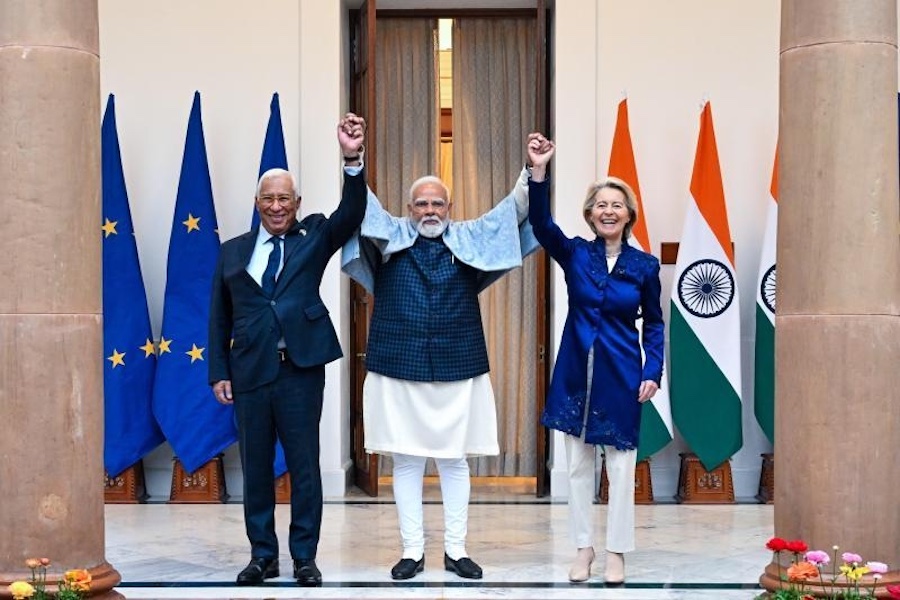#Europe
Economic policy coordination: Commission sets out guidance to help tackle the energy crisis and make Europe greener and more digital
Historically high energy prices, high inflation rates, supply shortages, increased debt levels and rising borrowing costs are affecting business activity and eroding households' purchasing power.
These challenges call for coordinated action to secure adequate and affordable energy supply, safeguard economic and financial stability, and protect vulnerable households and companies while preserving the sustainability of public finances. At the same time, rapid action is needed to boost potential growth and quality job creation and deliver on the green and digital transitions. Economic policy coordination through the European Semester will help Member States achieve these objectives by setting priorities and providing clear and well-coordinated policy guidance for the year to come.
Annual Sustainable Growth Survey
This year's Annual Sustainable Growth Survey puts forward an ambitious agenda to further strengthen coordinated EU policy responses to mitigate the negative impacts of energy shocks in the short term. At the same time, it is crucial to continue increasing social and economic resilience and fostering sustainable and inclusive growth in the medium term, while maintaining flexibility to tackle new challenges. This approach is in line with the UN Sustainable Development Goals, which are an integral part of the European Semester.
The four priorities under the European Semester remain: promoting environmental sustainability, productivity, fairness and macroeconomic stability, with a view to fostering competitive sustainability.
The Recovery and Resilience Facility, with a budget of €723.8 billion in grants and loans, is continuing to provide a steady stream of investments in European businesses, infrastructure, and skills, and is supporting an ambitious reform agenda until 2026. As of today, the Commission has endorsed 26 national Recovery and Resilience Plans, all of which have been approved by the Council. So far, payments disbursed under the Facility amount to over €135 billion.
REPowerEU, the EU's plan to rapidly phase out the EU's dependence on Russian fossil fuels, will mobilise additional resources to increase the resilience of EU energy systems and prevent energy poverty through targeted investments and reforms.
Opinions on the draft budgetary plans of euro area Member States
The Commission assessed the consistency of the draft budgetary plans for 2023 with the Council Recommendations of July 2022. They take into account the continued application in 2023 of the general escape clause of the Stability and Growth Pact.
Under the fiscal recommendations for 2023, low and medium-debt Member States should ensure that the growth of nationally financed primary current expenditure is in line with an overall neutral policy stance. High-debt Member States were recommended to ensure prudent fiscal policy, in particular by limiting the growth of nationally financed primary current expenditure below medium-term potential output growth.
The Commission invites Belgium, Portugal, Austria, Lithuania, Germany, Estonia, Luxembourg, the Netherlands, Slovenia and Slovakia to take the necessary measures within the national budgetary process to ensure that their 2023 budgets are fully in line with the Council's Recommendations.
Given that Croatia will join the euro area on 1 January 2023, the Commission welcomes its decision to present a draft budgetary plan for the first time.
Euro area recommendation
This recommendation presents tailored advice to euro area Member States for the period 2023–2024 on those topics that affect the functioning of the euro area as a whole.
Euro area Member States should:
- Continue to coordinate fiscal policies to support the timely return of inflation to the European Central Bank's 2% medium-term target;
- Sustain a high level of public investment to foster social and economic resilience and support the green and digital transitions;
- Ensure that support provided to households and companies that come under financial stress because of the energy crisis is cost-effective, temporary, and targeted to vulnerable ones, in particular SMEs. In that respect, the recommendation suggests setting up a two-tier energy pricing system that ensures incentives for energy savings, replacing broad-based price measures. Under this system, vulnerable consumers could benefit from regulated prices.
- Foster wage developments that protect wage earners' purchasing power, while limiting second-round effects on inflation. Develop and adapt social support system as needed.
- Further improve active labour market policies and address skills shortages.
- Ensure the effective involvement of social partners in policy-making and strengthen social dialogue.
- Further improve the business environment and preserve macro-financial stability.
Alert Mechanism Report
The Alert Mechanism Report is a screening exercise to detect risks of potential macroeconomic imbalances. It identifies Member States for which in-depth reviews are needed to assess whether they are affected by imbalances requiring policy action.
This year's Alert Mechanism Report concludes that in-depth reviews are warranted for 17 Member States: Cyprus, France, Germany, Greece, Italy, the Netherlands, Portugal, Romania, Spain and Sweden (which were subject to an in-depth review in the previous annual cycle of Macroeconomic Imbalance Procedure surveillance), as well as Czechia, Estonia, Hungary, Latvia, Lithuania, Luxembourg and Slovakia (which were not subject to an in-depth review in 2021/2022).
Proposal for a Joint Employment Report
The proposal for the Joint Employment Report (JER) confirms that the EU labour market has fully recovered from the COVID-19 pandemic, showing a strong performance and surpassing pre-pandemic employment levels since the third quarter of 2021. Despite strong growth, young people, women, and vulnerable groups, such as people with disabilities or with a migrant background, need further support to join the job market. Policies to help workers get in-demand skills need to be strengthened to mitigate the risks of high labour and skills shortages and to support job-to-job transitions in changing labour markets, especially against the background of the green and digital transitions. Promoting just labour market transitions is important to reach the 2030 EU headline targets on employment and skills, which are integrated into the JER.
Price increases since 2021, accelerated by Russia's war of aggression against Ukraine, have put pressure on both the EU economy and households. Real GDP growth slowed down in the spring of 2022 and household income in real terms decreased for the first time since the COVID?19 pandemic. In this context, collective bargaining and fair and adequate minimum wages are powerful tools to preserve the purchasing power of wages while promoting employment. To complement this, action should be taken to improve the coverage and adequacy of minimum income protection. This will also contribute to the 2030 EU headline targets on employment and poverty reduction.
Post-programme surveillance reports
Post-programme surveillance assesses the repayment capacity of Member States that have benefited from financial assistance programmes. The post-programme surveillance reports for Ireland, Greece, Spain, Cyprus and Portugal conclude that all five Member States retain the capacity to repay their debt.
Today's post-programme surveillance report for Greece is the first one prepared for the country, following the end of the enhanced surveillance framework in August 2022. The report finds that Greece has taken the necessary actions to fulfil its commitments, despite the challenging circumstances due to Russia's war of aggression against Ukraine. This report could serve as a basis for the Eurogroup to decide on the release of a final tranche of policy-contingent debt measures agreed in June 2018.
Next steps
The Commission invites the Eurogroup and the Council to discuss the documents presented today and to endorse the guidance offered. The Commission also looks forward to engaging in a constructive dialogue with the European Parliament on the contents of this package and as well as on each of the subsequent steps in the European Semester cycle.
Background
The European Semester provides a framework for coordinating Member States' economic and employment policies. Since its introduction in 2011, it has become a well-established forum for discussing EU countries' fiscal, economic and employment policy challenges under a common annual timeline. It continues to play this role in the recovery phase and in advancing the green and digital transition.
The Recovery and Resilience Facility is the centrepiece of NextGenerationEU, with €723.8 billion in loans and grants to support reforms and investments undertaken by EU countries. Its aim is to mitigate the economic and social impact of the coronavirus pandemic and make European economies and societies more sustainable, resilient and better prepared for the challenges and opportunities of the green and digital transitions.















